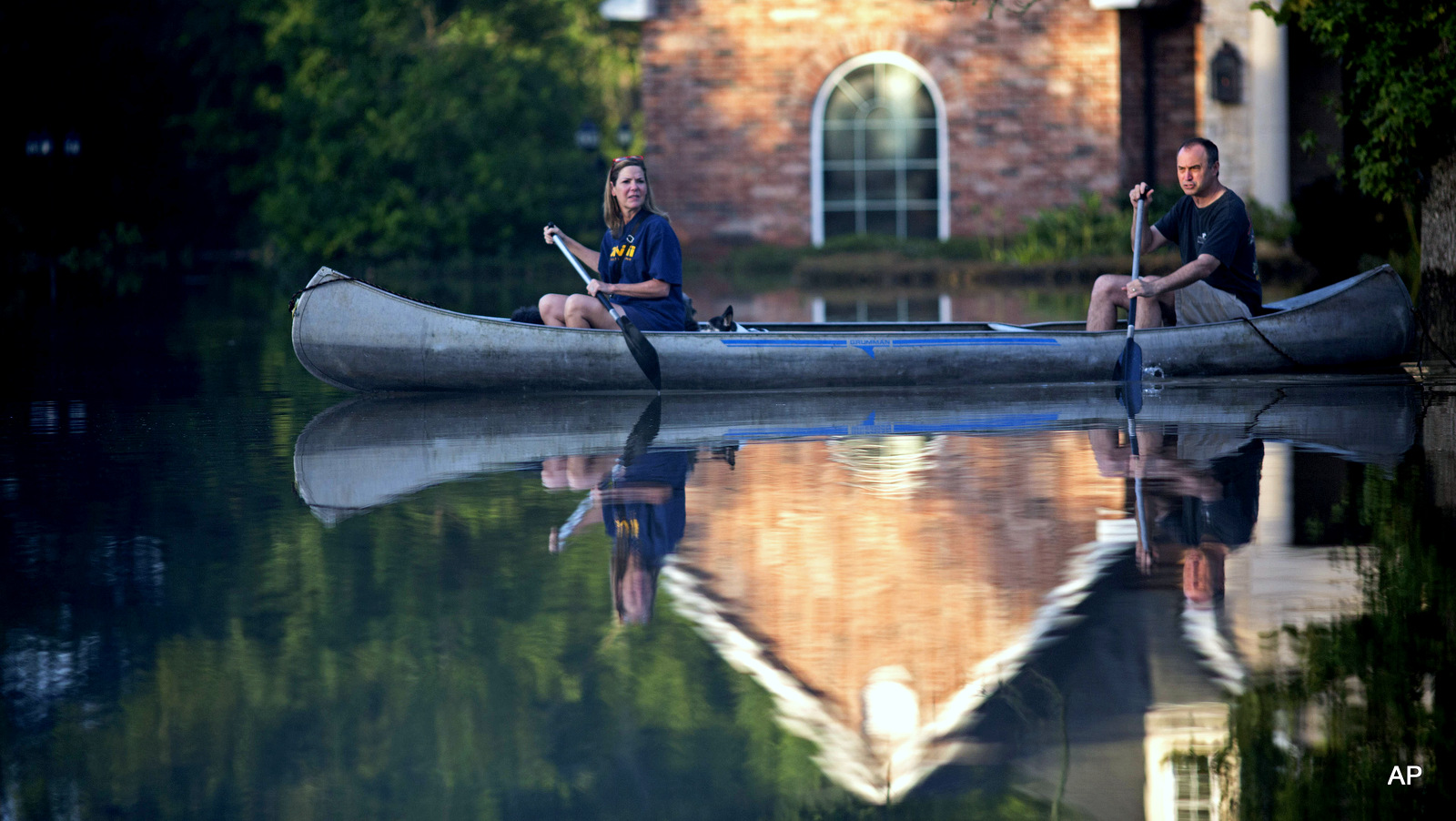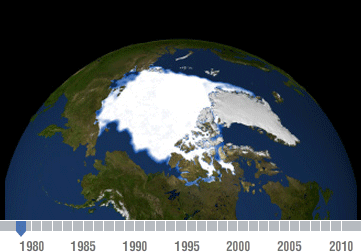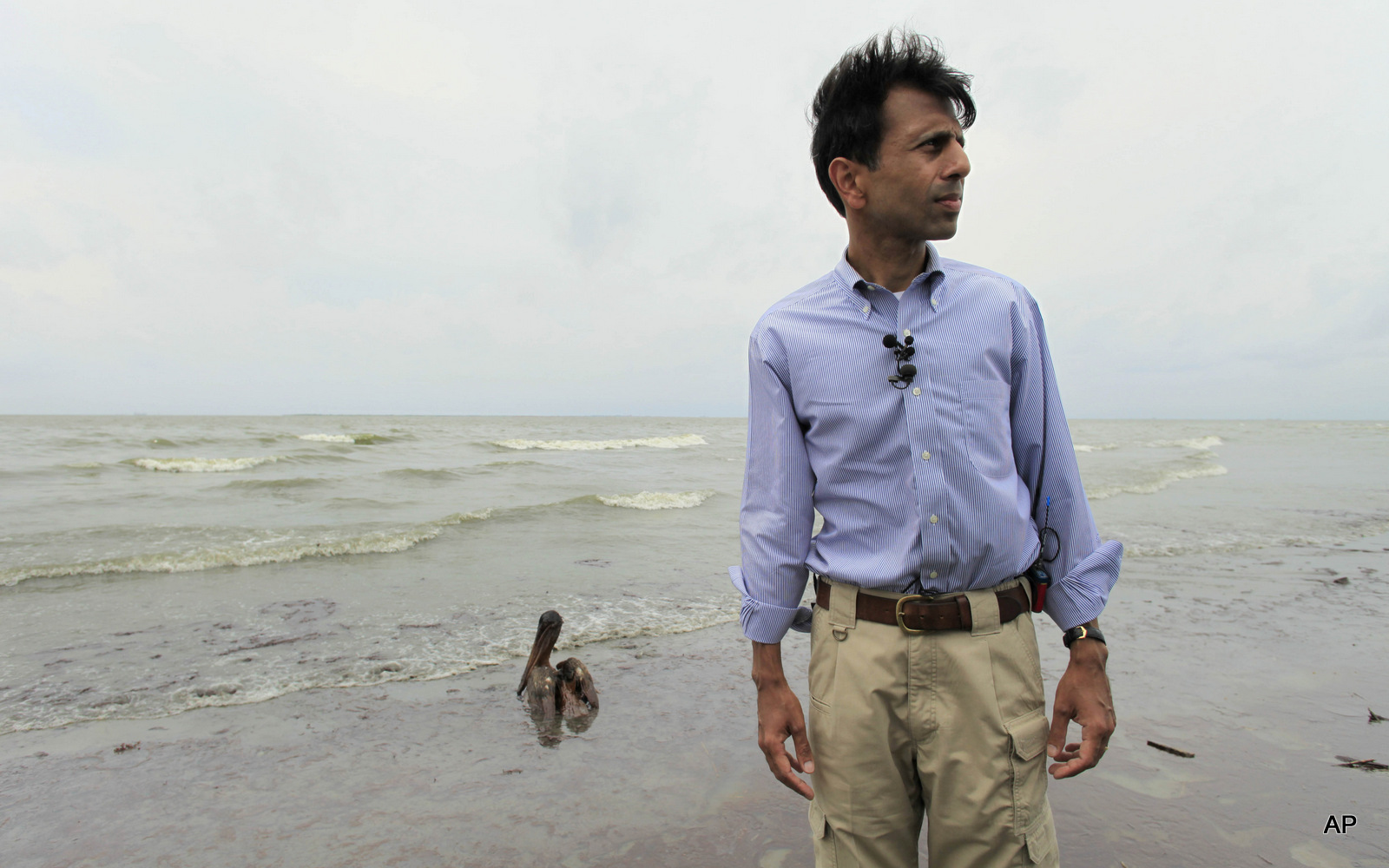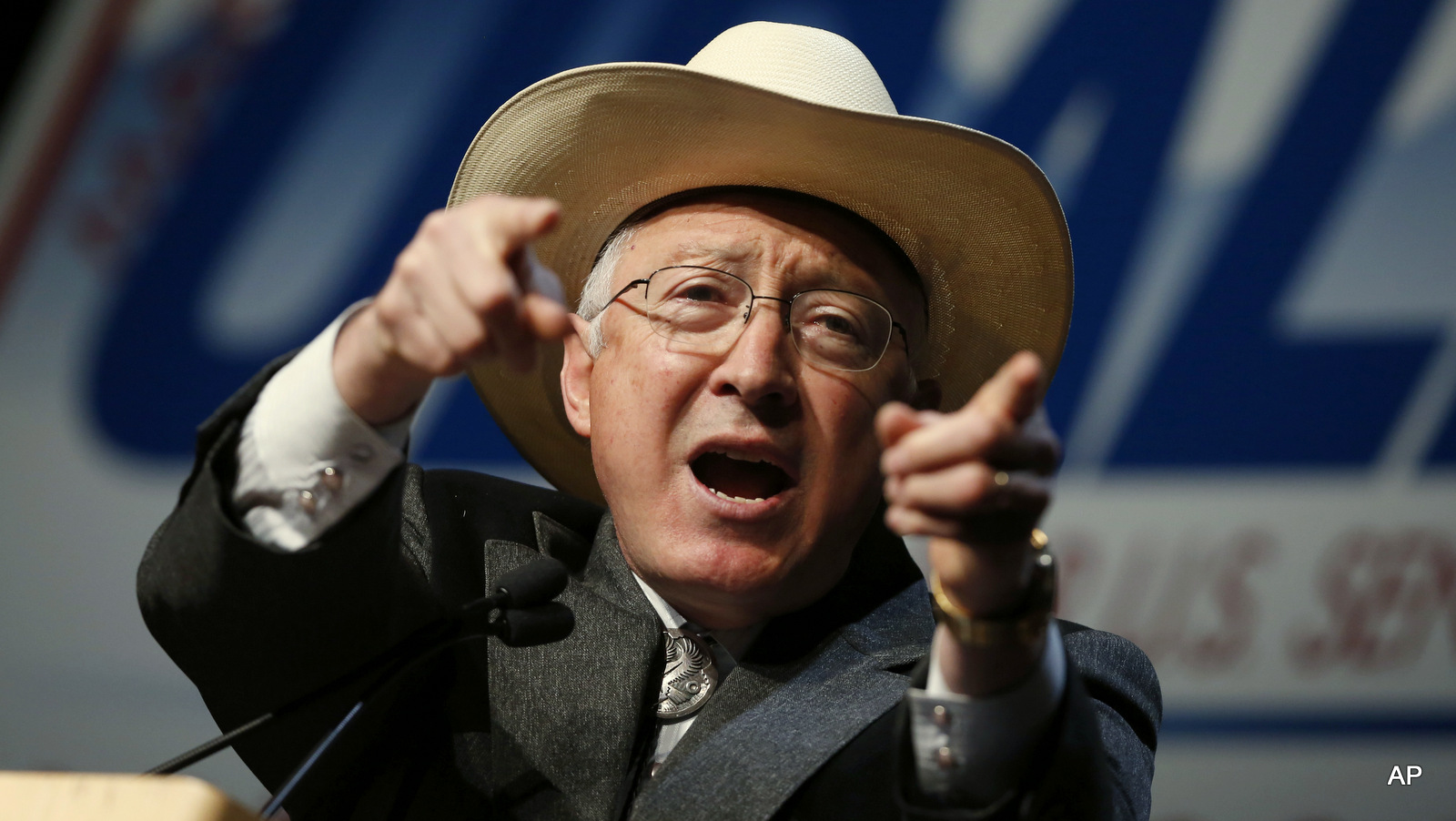Former Louisiana Gov. Bobby Jindal once declared that ‘the Obama administration is holding us hostage to their radical ideas’ about climate change, but thousands in the state are suffering from the very real effects of historic flooding caused by climate change.

Danny and Alys Messenger canoe away from their flooded home after reviewing the damage in Prairieville, La., Tuesday, Aug. 16, 2016.
AUSTIN, Texas — In addition to highlighting the growing impact of climate change on everyday Americans, historic flooding in Louisiana shows the deadly effects of long-term U.S. policies that include climate change denial, support for fossil fuels, and neglect of infrastructure.
At least eight people died, some 40,000 homes were damaged, and about 30,000 people were evacuated as flood waters rose earlier this month after heavy rains that began on Aug. 11. A dozen parishes in the state are considered federal disaster areas.
Both the national media and President Barack Obama have been criticized for being slow to respond to the floods. Some have even suggested that the flooding was underestimated because floods, unlike major weather events like hurricanes, aren’t given names.
“When you have a storm that is unnamed—it wasn’t a hurricane, it wasn’t a tropical event—people underestimate the impact that it would have,” said Louisiana Gov. John Bel Edwards, according to an Aug. 17 report from Slate.
“But this is historic. It’s unprecedented and we are seeing unprecedented flood levels as the water moves south.”
A warmer, wetter world
Climate scientists overwhelmingly agree about the reality of climate change and its increasingly devastating effects. While no event can be definitively linked to climate change, its effects are becoming increasingly obvious as extreme weather, from fires to flooding, becomes more commonplace.

Observations from NASA satellites show that Arctic sea ice is now declining at a rate of 11.5 percent per decade, relative to the 1979 to 2000 average. Melting Arctic sea ice due to climate change is contributing to the rapid rise of sea levels, and subsequent flooding.
Reflecting on the floods on Aug. 15, climate experts Bob Henson and Dr. Jeff Masters, founder of Weather Underground, wrote:
“Climate change has already been shown to increase the amounts of rain falling in the most intense events across many parts of the world, and extreme rainfall events like this week’s Louisiana storm are expected to grow increasingly common in the coming years.”
While man-made climate change promotes globally rising temperatures and increasingly frequent droughts, it also contributes to severe storms. The Washington Post’s Philip Bump reported on Friday:
“A warmer atmosphere can also hold more moisture before it falls. For every 1.8 degrees Fahrenheit the temperature of the atmosphere increases, the moisture-holding capacity of the atmosphere increases 7 percent, according to the Centre for Ecology & Hydrology in the United Kingdom.
That’s why climate models predict two seemingly contradictory trends: The world will get drier as the number of extreme precipitation events increases.”
The ‘radical ideas’ holding America hostage
There’s a long road to recovery ahead for the people of Louisiana, but they may have an advantage going forward: Breaking with many in his party, Gov. Edwards at least acknowledges the impact of climate change and the necessity of protecting state residents from its effects.
Bobby Jindal, Edwards’ predecessor who governed the state for eight years, sometimes acknowledged the reality of global warming, but overall, he denied prevailing climate change science. Jindal joined a host of Republicans who said he preferred to let “scientists” figure out how to handle climate change, even thoughJindal has a biology degree.

Then Louisiana Gov. Bobby Jindal stands with an oiled Brown Pelican on the beach at East Grand Terre Island along the Louisiana coast, June 3, 2010.
In 2014, as he prepared for an unsuccessful run for the GOP nomination for president this year, Jindal told members of the Heritage Foundation, an influential conservative think tank, that climate change is a “simply a trojan horse” to enable increased government regulation of business, according to U.S. News & World Report.
“It’s an excuse for the government to come in and try to tell us what kind of homes we live in, what kind of cars we drive, what kind of lifestyles we can enjoy,” Jindal said. “It’s an excuse for some who never liked free-market economies, who never liked rapid economic growth.”
“Emissions regulations and environmental protections introduced by the White House, he concluded, illustrate that ‘the Obama administration is holding our economy hostage to their radical ideas,’” Alan Neuhauser reported.
Jindal’s attitude is still reflected in today’s Republican Party, despite the shift in attitude among some leaders like Edwards. On Friday, Donald Trump, the GOP’s presidential nominee, made a high-profile tour of the flood zone and promised to support the victims as president, but he also has a history of denying climate change. In 2012, he took to Twitter to claim global warming was a Chinese conspiracy meant to undermine U.S. manufacturing. If elected, Trump has promised to “cancel” the Paris climate agreement.
Pro-fracking, ‘all of the above’ energy policies worsen climate change
Under the direction of climate change deniers, the GOP has repeatedly acted to block climate change legislation. They’ve even blocked climate action driven by the Pentagon, which is growing increasingly alarmed about the effects of climate change on global peace and stability, even as the U.S. military remains one of the world’s leading polluters.
And while the U.S. government, especially Congress, is infamously split along partisan lines, the Democrats have also contributed to worsening climate change. During his time in office, Obama has enthusiastically endorsed an “all of the above” energy policy that includes heavy investment in dirty technologies like fracking and natural gas.
While Democratic presidential nominee Hillary Clinton has promised to scale back fracking and support renewable energy, some observers are not confident in her commitment to these promises, especially after her appointment of Ken Salazar, a pro-fossil fuels, pro-fracking former senator, to lead her White House transition team.

Former U.S. Interior Department Secretary Ken Salazar gestures while speaking in support of the re-election of now-former U.S. Senator Mark Udall, in Denver.
On Aug. 17, David Sirota, senior editor for International Business Times, told Democracy Now! that Salazar is “somebody who is very close to the oil and gas industry, and somebody who has been a big defender of fracking, in the face of evidence that there are reasons to be concerned about the environmental and public health effects of that process.”
Expressing concerns on the influence Salazar would have on a new Clinton administration, Sirota asked, “What does it mean for the future, when another pipeline proposal, for instance, comes down the pike? We don’t know.”
And despite years of bipartisan support for fossil fuels, politicians have been unable to agree on financial support for the infrastructure on which American society depends. The American Society of Civil Engineers gives Louisiana a C- on its infrastructure report card, citing the state’s 1,827 structurally deficient bridges, 45 dams at high risk of failure, and a system of poorly maintained levees that Louisiana depends on to hold back flood waters.
Ironically, that puts the fossil fuel industry itself at risk in extreme weather. According to an Aug. 17 report from Bloomberg, rising sea levels, along with catastrophic flooding, threaten $100 billion in energy infrastructure in the state of Louisiana.
“Louisiana has an ambitious — and expensive — plan to protect both its backbone industry and its citizens from this threat but, with a $2 billion deficit looming next year, the cash-poor state can only do so much to shore up its sinking coasts,” wrote Bloomberg’s Catherine Traywick. “That means the oil and gas industry is facing new pressures to bankroll critical environmental projects — whether by choice or by force.”
Writing on Friday for The Guardian, Raul Grijalva, a Democratic representative from Arizona’s 3rd District, wrote that “Republican leaders have made compromise on climate issues impossible.”
As global warming worsens, Grijalva suggested that political action on climate change will become inevitable if the species hopes to survive. He continued:
“In throwing away a once proud environmental legacy, the party of Donald Trump – the party that makes oil drilling the centerpiece of its environmental agenda and insists that climate scientists are just ganging up on Exxon to enrich themselves – is forfeiting its seat at the table when climate policy is inevitably made down the line.”
Grijalva added that climate denial is both dangerous to the U.S. and harmful to the GOP’s continued relevancy, noting that:
“Pretending that climate change isn’t real was politically expedient in the past. Today it’s dangerous for millions of Americans, and it dooms the Republican Party to irrelevance in climate discussions.”




No comments:
Post a Comment